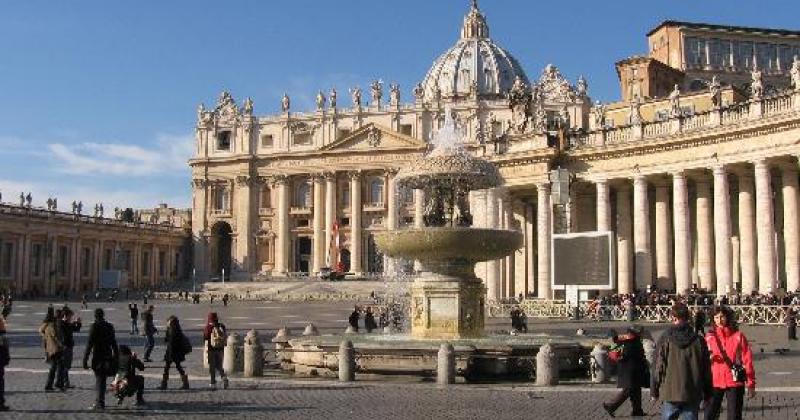When President Barack Obama and Pope Francis sit down Thursday, March 27, at the Vatican, the meeting may well offer a vision of what could have been for Democrats and the Catholic church over the last six years: a leader of the state and a leader of the church working on the many issues where they agree while working through the issues where they don't.
Of course, that's not exactly how it's gone for Obama and the US hierarchy, even though Obama and the church both stress economic justice and the priority of the common good, universal health care, robust government support for the needy, and comprehensive immigration reform.
The potential for a robust alliance fizzled almost from the start of Obama's candidacy in 2007, and a relationship that began badly went downhill when he was elected.
Many Catholic bishops were already deeply worried about Obama's support for abortion rights, and just four months into office, many prelates denounced Obama's honorary degree from the University of Notre Dame.
Not long after, an epic dispute over abortion funding in the healthcare reform law -- the president's signature domestic achievement -- led the U.S. Conference of Catholic Bishops to denounce the law even though it advanced a goal they had sought for decades.
That split only widened further when the administration used the law to promulgate a mandate that employers provide free birth control coverage in their health plans, a policy that angered the bishops and led to a full-scale campaign by the hierarchy against the White House.
Gay rights (and same-sex marriage in particular) emerged as the next front in this battle, with both sides staking decidedly disparate positions -- the bishops opposed, the White House in support -- while raising the level of rhetoric over what was at stake.
But Francis' election a year ago marked a sea change in Rome's approach as the new pope repeatedly sought to emphasize the church's dedication to social justice while moderating the church's profile in the culture wars. It's a shift some say could portend a "reset" for relations between the U.S. bishops and the Obama administration.
"Anytime there is a change in leadership, whether in the Holy See or in the United States, it provides an opportunity to assess where one stands and to renew relationships," said Joshua DuBois, former head of the White House's faith-based office.
"This is a moment to assess the possibilities for closer collaboration and to find some areas to work together."
Sr. Mary Ann Walsh, a spokeswoman for the USCCB, said the American bishops "have appreciated the administration's collaboration on matters of mutual concern," such as immigration reform and international peace. She added that issues like gay marriage and abortion "remain areas of concern" and said the bishops "have been encouraged by Pope Francis in their efforts to address these issues."
Privately, however, some bishops are hoping for more cooperation because the church and the White House share so many pressing priorities.
"There's fault on both sides," said a senior U.S. churchman who was cautiously optimistic about a thaw, though he still spoke on condition of anonymity because the president remains controversial among the hierarchy.
Administration officials say they have detected a subtle shift in tone and have seen greater collaboration in some areas, in part because both sides realize that the contraception mandate will be decided in the courts and in part because global issues of peace and religious freedom have become so urgent.
Plus, there's the so-called "Francis effect."
"I think they've gotten the Francis message, that it can't just be all bricks that you throw at the administration, that you've got to find a way to work together," especially on global issues, said an administration official who was authorized to speak anonymously because of the sensitivity of the issue.
But others aren't so sure there will be any real shift in the dynamic between the USCCB and the White House, and certainly not because of the Vatican summit between Francis and Obama. For one thing, Obama needs the meeting more than the pope does, politically speaking, and the Vatican may not want to give the president all he wants.
"The pope is going to do everything he can to make sure that there is not a millimeter of distance to be found between himself and the U.S. bishops' conference," said George Weigel, a conservative commentator and widely read Catholic author who met with Francis for an hour earlier this month.
"How the White House spins the meeting is, obviously, a different matter, as it's clear to everyone with eyes to see that the White House intent is to use the pope's popularity to bolster the president's fading position," Weigel said. "The challenge for the Vatican will be to make sure that White House spin does not completely dominate coverage of the story."
Obama-friendly Catholics don't see it quite that way, and believe that the two leaders will have "a terrific meeting," as Stephen Schneck, head of the Institute for Policy Research & Catholic Studies at The Catholic University of America, put it.
But Schneck also said he doesn't think the meeting will portend change back in Washington, as much as he and some church officials wish it were otherwise.
"My sense is that the bishops' conference realizes that Obama is a lame duck at this point," said Schneck, a supporter of the president and an occasional adviser to the administration on Catholic issues. "They're content to leave it at that and are not interested in expanding the level of engagement or the warmth of the relationship."
"It will be a gradual process for the breeze from Rome to make its way over here," he added. "It's starting. I feel it. But it's not really a full breeze yet. It will take a while."
